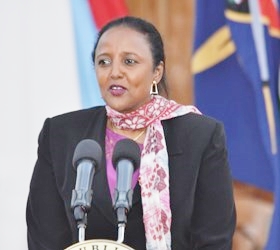
Kenyan Foreign Minister Amina Jibril Mohamed on Sunday said criticisms that her country was involved in internal politics in Somalia are not helpful in ongoing efforts to end the decades-old conflict in the Horn of African country.
Mohamed made the remarks in an interview with Xinhua on the sidelines of the one-day summit on harmonizing the operation of the African Union Mission in Somalia (AMISOM).
Kenya’s top diplomat stressed that now is the opportune time to martial all the resources to help stabilize Somalia by 2016.
The summit of the African countries contributing to AMISOM troops was held amid displeasure between Kenya and Somalia, whose government complains of Kenya’s involvement in internal politics in the southern town of Kismayo.
Somalia wants to control the seaport and the airport among other installations and have all the revenues remitted to the central government, after the Indian Ocean town was recaptured from rebels not long ago with the help of Kenyan troops.
Mohamed said Kenya has not formally received the complaints, noting that Kenya has instead been supportive of the efforts to pacify its northeastern neighbor.
“I have not had any complaints directed against us, maybe there are challenges that we must address but I think all of us need to come together to ensure that we can get more people involved in Somalia because I think we now have a window of opportunity,” she said.
“If we all pool together and support the Somalis, we would get to where we expect to get so that all of us as promised we can leave Somalia by 2016,” she added.
“We have been supporting the Somali people to stabilize their country.
“In Kenya, we have over the last 20 years been involved in peace processes.
“We have held several conferences in Nairobi and other parts of the country to help Somalia find its place within our region and also find its way back into the international community,” she noted.
She said the Somali government bares the responsibility to win over the hearts of its people for it to take fully charge of the administration of the whole country.
“We have two years to ensure that the Somali government wins the hearts and minds of its own people, reconciles them, takes over the administration of all parts of the country from us who have been there for a while,” she said.
“I think there is a lot of work for all of us and there will be very little time for us to complain,” she added.
“All of us are in control of our countries but in order to be in control of an area, you have to have some stability there, you must have security, you must have acceptance from the locals … that is what the Somali government must do, it must get the confidence of its people so that it can go and establish all these institutions without any opposition.”
Mohamed said Somalia should use the opportunity it was given to convene a reconciliation conference of all the Somalis.
She said ongoing efforts by AMISOM to stabilize Somalia need more support in order not to lose the successes so far gained.
She said African countries must look for resources to fund the operation of AMISOM since the operation’s main funder, the European Union, has notified the African Union that it is facing financing problems because of the economic downturn back home.
“We have already started talking to other countries, those that are not traditional donors, to see whether they can come in and support us.
“Some have been very encouraging and we are hoping that going forward, they will be willing to support us,” she said.
She said the main challenge AMISOM is facing is lack of enough troops on the ground. Troop contributing countries to AMISOM estimate that over 20,000 troops are needed in the country from the previously need 17,000.
“We are all overstretched right now and we are talking to other countries to see whether they can come in and support the efforts that we have made.
“Since we and those in the region went into Somalia, we have had really a game changer. We have been able to deal with the threats we face,” she said.
Uganda provides the bulk of the peacekeeping troops to AMISOM.
The other troop contributing countries include Kenya, Burundi, Djibouti, Ethiopia and Sierra Leone.
Since the deployment of African Union troops in Somalia in 2007, there have been military gains in the country despite some attacks from Al-Shabaab, a militant group linked to Al-Qaida, a known international terror group.













